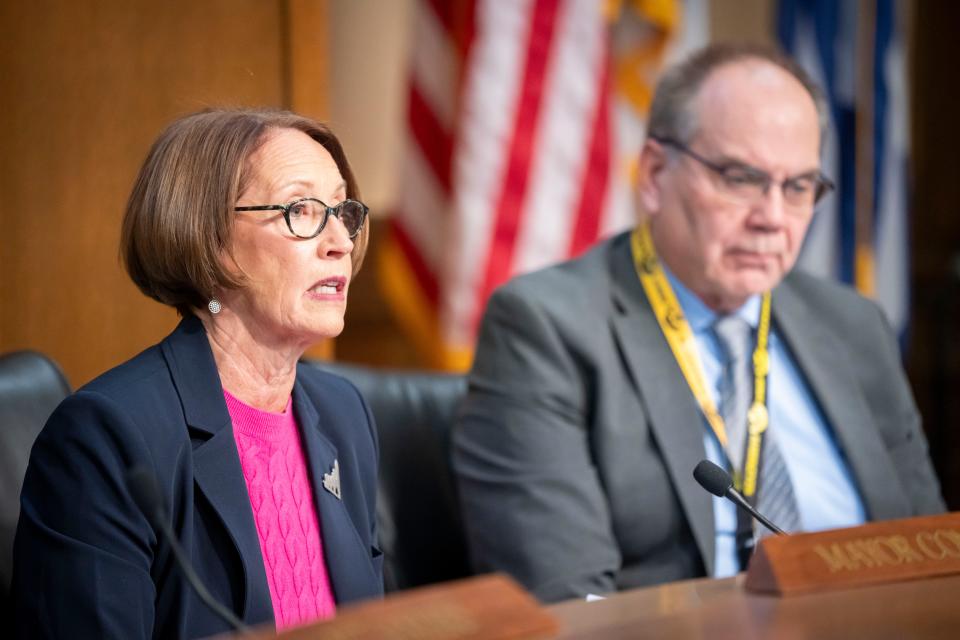Rules for participation at Des Moines City Council are changing. What you need to know.
Des Moines community members will soon be granted more time to sign up to speak at City Council meetings and will be able to raise concerns about agenda items that often go undiscussed.
The Des Moines City Council approved changes to its rules governing public participation at its meetings Monday night, allowing residents to get three minutes to speak about consent agenda items at the beginning of each meeting, for up to 15 minutes. Previously, speakers could only address the consent agenda during a registered speaking period just before the meeting adjourned — and long after the items were passed.
Connie Boesen, shortly after being formally sworn in as mayor, told the council that the city had heard from residents at forums and meetings that the public needed more opportunity and time to speak on agenda items.
"We have heard, and we're extending some of the times and making a greater opportunity for input," Boesen said.
The changes will take effect at the next meeting on Jan. 22.

What are the City Council's procedural rule changes?
Items on the City Council's consent agenda are those considered routine and non-controversial items that are considered in bulk at the council meeting, according to council procedural rules. In the past, some consent items have included approving spending on the Des Moines Police Department, which has been met with backlash from opponents.
Other changes include extending the deadline to sign up to speak up to one day before the meeting, according to the resolution. Previously, the rule has been that a resident must register six days before a council meeting and two days before the agenda is even made public.
In practice, people will now receive the agenda on Thursdays and have the ability to sign up to speak on both consent agenda items and general comments by 5 p.m. Sunday.
The council also approved adjusting how public comment at the end of the meeting is handled. Previous rules granted two minutes per person for up to 30 speakers. That will change to three minutes for 20 speakers. The collective time for all speakers is up to one hour.
Ahead of the vote, council member Josh Mandelbaum lauded the mayor's decision to bring the changes to the agenda.
"I think it reflects feedback that we've heard from the council, and I think this is a great way to start your term, by making our meetings a little bit more accessible and a little more transparent ... it's a great step forward," Mandelbaum said.
What's not included in the changes?
Not included in the changes was remote participation, something many community members have long called for to accommodate their schedules, disabilities or other barriers that prevent them from attending meetings in person.
Currently, if the City Council meeting is not entirely electronic, then only those persons in attendance at the physical location of the meeting will be permitted to speak and only in accordance with these rules and the City Code, according to the city. The public can live-stream the meetings on the city's YouTube channel.
Mandelbaum said he would consider supporting a change to allow for virtual input from community members affected by zoning hearings, to start with. He said if rule changes were made on virtual participation, he'd want to see speakers sign up ahead of time.
Council member Joe Gatto said there has always been an option for someone to participate virtually if they have a "legitimate" reason they can't attend in person. Only council members can participate over the phone if they cannot make the meeting in person.
Council member Linda Westergaard told the Register she believes the state prevents virtual meetings unless there is a state of emergency declaration. Iowa law notes that a "governmental body may conduct a meeting by electronic means only in circumstances where such a meeting in person is impossible or impractical." It also requires providing access to the public and having the meeting take place where the communication originates, the law states. Minutes of the meeting must also be kept.
At-large council member Carl Voss added he would have to look into the challenges of streaming the meetings and how to allow remote users to participate.
Boesen told the Register she is not currently supportive of allowing virtual public participation, pointing to some technical challenges, including a "Zoom-bombing" incident when city meetings were virtually held during the COVID-19 pandemic. Boesen added she would revisit if there are enough community members who are interested in virtual participation, but even then, "I would need to see if we had the capability to do it well," she said.
Council member Chris Coleman did not immediately return the Register's requests for comment.
Des Moines resident Adam Callanan called for the city to allow residents to participate virtually. He pointed out that residents who don't have child care may be prevented from coming to meetings, and with the area under an active storm warning Monday night, others could be dissuaded due to the weather.
"I'm glad to see a lot of the changes that are made today to make meetings more accessible," he said. "But as long as we're leaving out some populations, I still don't think the city's meeting the needs of the people. I think the city works best when more residents are heard."
Addison Lathers covers growth and development for the Des Moines metro. Reach her at ALathers@registermedia.com and follow her on Twitter at @addisonlathers.
Virginia Barreda is the Des Moines city government reporter for the Register. She can be reached at vbarreda@dmreg.com. Follow her on Twitter at @vbarreda2.
This article originally appeared on Des Moines Register: Rules for public participation at Des Moines City Council are changing

